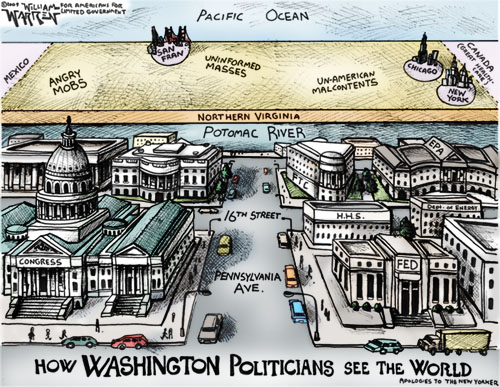
There are two more weeks until the Congress returns from its traditional August home-work period. While many scoff at the notion of elected officials and some of their staff spending extended time in their district or state, I disagree.
If I had my way, members of Congress would spend more time back home, and they would be required to hold at least one, open to the public, in state meeting a month. What better way to learn about how the people back home feel about any number of issues than to actually have to stand before them and listen.
While issue lobbyists scramble their resources at the mere thought of in-district meetings with the all-important goal of getting a question asked by a local on an issue that the member thinks only people in D.C. care about, it is still critical to disconnect the elected and their staff from the constant self-perpetuating flow of information they get inside the Beltway.
On issues like immigration, they might learn that the local businesses and groups are much less enthusiastic about the prospect of amnesty and H1B visa applications than those who speak for them nationally.
Similarly, they would learn how workers are getting shunted to part time status due to the impacts of Obamacare, and it doesn’t even have to be boring.
Illinois Members could have been at the Cubs game last week where the grounds crew was unable to get the tarp on the field during a deluge, causing the end of the game to be played the next day. The Chicago Tribune reports that the Cubs had cut down on the hours of their grounds crew members to avoid hitting Obamacare’s hours worked threshold that would require the team to provide health coverage. Just one high profile example of the unintended, but widely predicted, side effect of Obamacare’s employer mandates – formerly full-time workers are becoming part-timers.
Members of Congress could spend much more time with constituents at work sites, visit places where domestic energy is actually produced, check-out construction progress, or lack thereof, of bridges and other infrastructure that taxpayer’s fund. They could visit local government council meetings, and get real briefings on pressures created by a flat tax base and federally mandated spending. Armed with the knowledge of what local priorities get shoved aside to fund D.C. mandated programs, Members and their staffs would be much better armed to fight against these types of top down programs when it comes to authorizing funding for them.
They could even go to the grocery stores and see what used to be a line of people to check and bag groceries have been largely replaced by self-check-out stands due to the high cost of clerks, when they can get the customer to do it themselves. Who knows, they might even question the wisdom of another minimum wage increase that would almost certainly bring this same technology to other retailers.
Obviously many members already use their existing district work periods to meet with constituents and get a better handle on what is happening back home. It just doesn’t happen enough, and one of the reasons is due to the mischaracterization of district work periods as being a vacation.
The reason that the House and Senate don’t typically do much business on Monday and Friday is because many Members are scrambling to get to or from their districts on those travel days. If the House and Senate schedules included at least one week-long break each month, the need to rush home on weekends would be lessened, and those days could be devoted to D.C. activity.
The truth is that members and their staffs are well served by getting out of D.C., and back home to hear from people impacted by the federal government’s vast overreach, rather than constantly hanging out with those who are paid to tell them a story.
That’s why the next time someone complains that Congress spends so much time away from D.C., I am going to just answer, fantastic, I’m glad they are home listening to the people.
Rick Manning is the vice president of public policy and communications for Americans for Limited Government.







